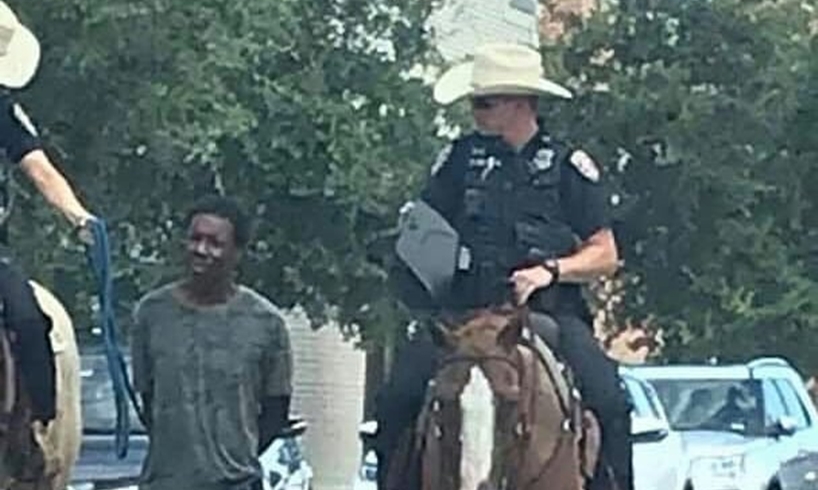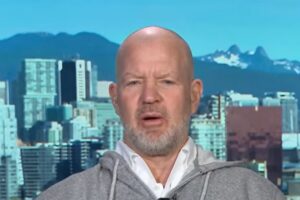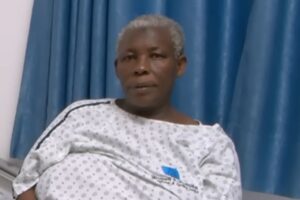
A picture of Donald Neely, 43, a homeless black father of eight with mental illness, with his hands tied to a rope being led by two Texas officers has caused outrage on social media.
The controversial photo, which was rapidly linked to slavery, featured Officer Patrick Brosch and Officer A. Smith, who are part of the Galveston police department.
One of the officers, who was mounted on horseback, held Neely by a blue rope or leash through downtown streets.
The arrestee walked with the line clipped to his handcuffs from 306 22nd St to the Mounted Patrol Unit on 21st and Market, giving passersby the opportunity to film it all.
In a statement issued by Police Chief Vernon Hale III, he apologized and said that the policy pertaining to how officers on horseback handle arrests will be changed.
He claimed that his department has “immediately changed the policy” to prevent the use of the controversial technique.
Hale also spoke about the two officers involved in the scandal and took the decision to defend their action.
Mr. Hale said: “I believe our officers showed poor judgment in this instance and could have waited for a transport unit at the location of the arrest. My officers did not have any malicious intent at the time of the arrest, but we have immediately changed the policy to prevent the use of this technique and will review all mounted training and procedures for more appropriate methods.”
Leon Phillips, the president of the Galveston Coalition for Justice, said the incident was humiliating for Mr. Neely and applauded the police department for putting an end to the technique.
Phillips said the officers should have called for a patrol vehicle to transport Neely to the police station.
Neely’s sister-in-law, Christine Neely, took to Facebook to say what the police did was racist and wrong.
She wrote: “Imagine that YOU are aware that living on the streets is dangerous, unsanitary, makes you a target for crime/law enforcement and isolates you from your family but YOU CAN’T make that relative understand that despite your many efforts. Imagine searching the streets of a city for days looking for your loved one, to no avail. Have any of you ever went to breakfast, lunch, and dinner at the local homeless shelters hoping you’d find your loved one having a meal with hopes to kidnap them and bring them home.”
She went on to explain: “Imagine locating your loved one, getting them in your car, and they jump out of your moving vehicle to keep you from taking them from where they now call home. Just imagine for one second being 1 of his eight children who have been fatherless for years and your father isn’t incarcerated or dead.”
The picture went viral and caused a heated debate on social media with on person sharing this comment: “I honestly don’t see why the outrage. They are on horseback, and they have the rope tied to the cuffs to prevent him from running. They were walking him to a patrol unit. You can’t scream racism for every little thing. This is partially y racism sometimes isn’t taken as seriously by some. People are so quick to call racism over the smallest details that have reasons behind it. You act like they had a noose around his neck smh.”
Another defended Neely: “They’ll be people who say it’s nothing or everyone’s making a big deal…the facts are white arrests are never degrading despite if their crimes or horrid or not, whereas if a black person is arrested it’s either through force or some means of humiliation for nothing..they were supposed to wait for an officer with a car! It’s in the books!”
This social media user opted to defend the police officers: “Hey, how about we all critically think for a second.. if the officers are on horses, riding back to the station, how would they transport the person they arrested? They obviously don’t have cars, they can’t hold his wrists, and it would be inefficient to call another officer with a car over to their location, so the most logical solution would be? Right! “Extend” your hands. There’ s too much unnecessary drama in this comment section.”
The officers will not be disciplined for their actions.






